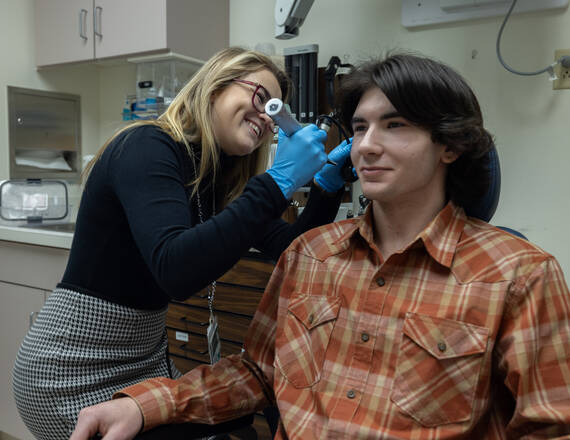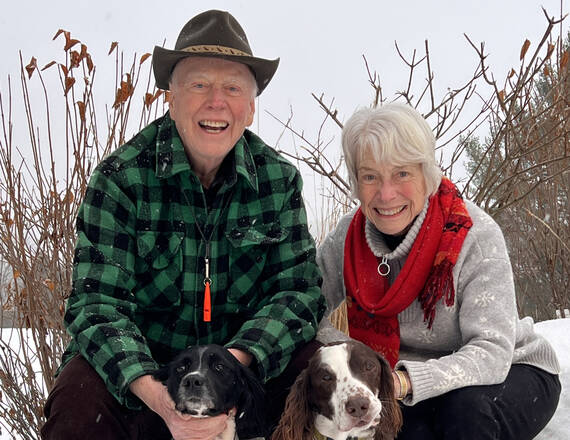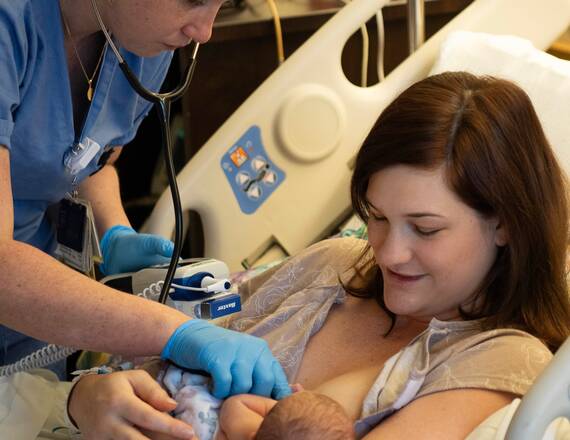A friendly face coordinating complex care for children
Colton Ricottelli lives more than two hours from the Children’s Hospital at Dartmouth Hitchcock Medical Center (CHaD). But, because he was born with a cleft palate, the 14-year-old must regularly make trips from his rural hometown of Berlin, N.H. to Lebanon, N.H. to see specialists, and undergo various surgeries and procedures that have given Colton a childhood with as much normalcy as possible.
It’s a trek, Colton’s mother Megan Ricottelli says, “especially in the snow."

Because of the distance, every trip to the hospital takes the whole day. That means Colton has missed school and baseball practices. His mother also sometimes has to miss her own classes as she works toward a degree in social work. Arrangements need to be made for after school care for Colton’s younger sister, and driving that far can get expensive. The barriers the Ricottelli family faces to get Colton the care he needs quickly add up.
But they’re not alone in navigating these impediments. As a lifelong patient in the Face of a Child Program at CHaD, Colton’s care is largely organized by Shelly Calley, the program coordinator. Healthcare coordinators often do most of their work behind the scenes as unsung heroes, but for families like the Ricottellis, Calley’s work ensuring patients get the best and more comprehensive care make her an essential part of their care team.
“She’ll move mountains to try to help us,” Megan says of Calley. “She goes above and beyond to make sure that you’re comfortable, and everything is on track and on schedule.”
Children born with craniofacial anomalies often require complex care from multiple specialists over many years. A child with a cleft palate, for example, could need plastic surgery early in their life to repair the palate, as well as additional oral and facial surgeries improve their ability to eat and speak. Cleft palates also often affect a patient’s auditory system, so the child might need further surgeries to specifically target their ability to hear. Beyond surgery, they might also need specialized dental and orthodontic care, speech therapy, and hearing aids.
The Face of a Child Program was designed to address the complex coordination required to treat children with craniofacial anomalies. Instead of families needing to schedule several individual appointments, navigating separate specialists’ offices and systems along the way, CHaD’s full-service, comprehensive craniofacial program offers one-stop care. And it’s all coordinated by Calley.
The program organizes frequent full-day, full-team clinics, as well as specialty-focused clinics, that bring the various care teams required together. This allows Calley to more easily schedule patients’ many appointments for the same day so families only need to travel to Lebanon once to see all their specialists. It also gives the medical teams more opportunity to collaborate.
“That’s the whole goal of this multispecialty clinic,” Calley says. “We get all those providers in the same place at the same time to make it more doable, more accessible for patients. It’s making sure that accessing complex care is just not so complicated.”
Securing treatment for children like Colton is not only logistically challenging, but trips to the clinic can be a financial challenge, too. Calley has been instrumental in offsetting that burden that may otherwise be insurmountable. Thanks to philanthropic support for the program, Calley is able to supply families with gas cards and vouchers for the hospital food court. She also connects them with other support services available at CHaD.
For the Ricottelli family, this compassionate approach makes all the difference, and Calley is an essential touchpoint. “She’ll call me, and if I don’t get back to her, she’ll call me again. She goes out of her way to make sure that we’re both on the same page,” Megan says. And if there’s a little bump, she’ll be like, ‘Okay, you know what, let me call this one, and let me call that one. I’ll see if we can make this work.’”
To Calley, that’s just doing her job. “I’m always grateful and honored when I hear families say positive things about their experience. I really try to contribute to that experience for our families, so it’s always nice when I feel like my intentions are actualized,” she says.
But to Megan, the thoughtfulness that Calley and the rest of the team in the Face of a Child Program brings to their work makes a huge difference.
Megan recalls her first interactions with the craniofacial team at CHaD 14 years ago, when she was a first-time mom “trying to navigate these murky waters. Everybody was very reassuring and comforting, and made me feel safe, and made me feel like my son was safe. They were wonderful right off the bat. That’s one of the reasons I’ve stayed with Dartmouth. I won’t go anywhere else.”
From Colton’s perspective, the coordination among the specialists in the Face of a Child Program adds a sense of trust that things won’t fall through the cracks. “They’ve all just done a very good job working together as a team, making sure that their patient gets the best quality of their service,” he says. “They collaborated very well between audiology and Dr. [Mark] Smith,” an otolaryngologist in the program, whose kind professionalism Megan says has been particularly reassuring over the years, starting with Colton’s first surgery at eight months old.
Smith and the other specialists have not just been a great team, Colton’s mother says. They are also particularly attentive during individual appointments, often taking extra time to ensure Colton is given the best possible care.
Leah Mosenthal, Colton’s audiologist, “will stay until she gets Colton’s hearing aids completely lined up,” Megan says. “We have been in there for quite some time sometimes when he needs a little tinkering with his hearing aids. ‘I don’t want you to leave until they’re right,’ She is very patient, she is very kind. She’s caring.”
In the face of the overwhelming complexities of craniofacial care, the kindness shown by everyone from Calley to Dr. Smith makes a difference in how Colton feels about his many medical appointments.
Colton has spent a lot of time in the hospital throughout his life, but he doesn’t see the long trips to CHaD as a chore. “Most people don’t really look forward to going to the hospital because of all the things they have to go through,” he says. “I actually look forward to going to Dartmouth because they’re just so kind and caring.”
Seeing children like Colton thrive buoys our work at Dartmouth Health Children's. To learn more contact Polly Antol at Polly.Antol@hitchcock.org or at 603-646-5316.


